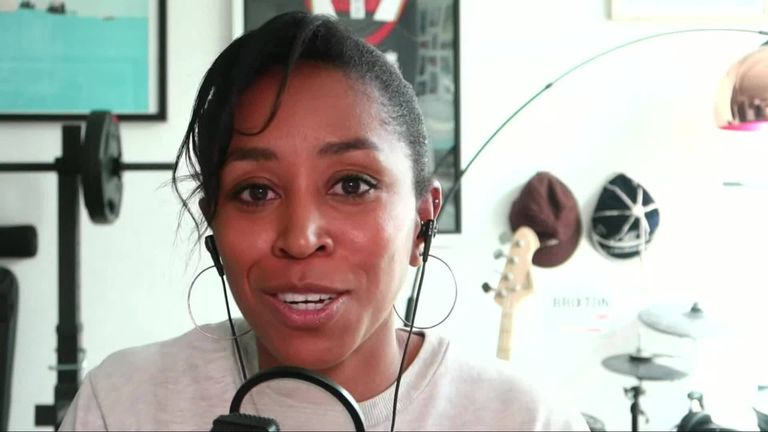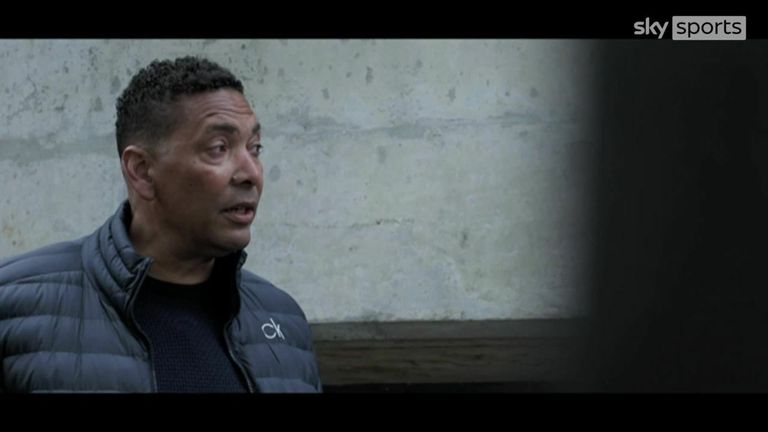Why has the number of Black cricketers in England dropped?
Sky Sports documentary You Guys Are History explores why number of Black British cricketers has dropped by 75 per cent in last 25 years; journalist Dean Wilson says there has been 'carelessness' from decision makers, while Ebony Rainford-Brent's ACE Programme is aiming to drive up numbers
Sunday 12 September 2021 10:31, UK
Devon Malcolm, Roland Butcher, Dean Headley, Mark Butcher, Gladstone Small, Jofra Archer, to name but six.
A host of Black cricketers have played pivotal roles for the England cricket team over the years but, in recent times, representation has dropped significantly.
Since Mark Butcher played his last Test, against South Africa in December 2004, just four Black players have featured for the England men's cricket team.
Another alarming statistic is that in the previous 25 years, the number of Black British professional cricketers has dwindled by 75 per cent.
Butcher explores the reasons why in his Sky Sports Cricket documentary, You Guys Are History, which also charts the highs and lows of England's Black cricketers since Roland Butcher became the first in August 1980.
Daily Mirror journalist Dean Wilson, who worked with Mark Butcher on You Guys Are History, feels a "carelessness" from administrators has played a part in the decrease of Black British cricketers.
Wilson said: "There are myriad reasons. It is not a simple story. Clearly the reduction of cricket in schools and urban areas plays a big part as that is where the black population is at its greatest.
"The love and passion the Caribbean community had for the game when they first came to the UK, it was just taken for granted that it would always be there.
"Actually, if you don't do anything to support it and feed it, you end up where we are today. I think it is a problem that has arisen by a lack of action. A carelessness, actually."
Ebony Rainford-Brent - the first Black woman to play for England - has taken plenty of action, establishing the African-Caribbean Engagement Programme (ACE) to get young people of Black heritage into the sport.
ACE was subsequently launched as an independent charity in October after receiving significant funding from Sport England and has now expanded out of London to Bristol and Birmingham.
Rainford-Brent told Sky Sports: "When you start to look at the history of who created the game, it became really obvious that the game is structured in our country to support a certain elite.
"Lots of private schools are known for producing great cricketers as that's where the systems have been designed from the early days.
"I think there is a lot of beauty in that system but it made me realise we need to design new systems from the ground up to support everyone else.
"We marketed it and in three weeks we had 100 kids turn up. Straightway we found a kid that ended up going to play for Surrey.
"I think the early success and the excitement from the community made us realise it's not that these people aren't engaged, it's that as a sport we are not doing enough to reach out.
"It gives me hope to know that not only is there a whole load of talent out there - ridiculous amounts of talent, some that's ready to go and some that just needs support - and a whole generation of kids that want to be inspired. There is a system to be designed to get them all in."
England fast bowler Archer said: "A lot of Black kids might say 'look what's happening, we don't want to be in that spot because of [the racist abuse] off the field and the added pressures.
"That's why we are here to pretty much fly the flag and let them know it can be done. Ebony is doing great work at the ACE programme and anything we can do to help will go a long way."
A distinct lack of Black British cricketers is mirrored when it comes to coaching, with Mark Alleyne the most recent Black man to coach a first-class county, having led Gloucestershire between 2004 and 2007. As of yet, there has been no way back for him to that level.
Alleyne - who has since coached the MCC and had a stint at the National Performance Centre in Loughborough - said. "The opportunities just didn't arise.
"The only interview I got was for the England Women's job - I was shortlisted when Mark Robinson got appointed. I didn't get any county interviews.
"I do think it's because of race but I don't think it's because people hate black people. I just don't think we have enough presence as a coaching group to give people the confidence that you can do a good job.
"An Aussie coach, say, can come over with a really good reputation, sometimes irrespective of what they have done, because they are hanging on the back of maybe other overseas coaches that have done well.
"Without knowing, sometimes when people see black coaches, they don't necessarily see them as high-performance people coming into your environment and making a difference. That's what we need to change."
Wilson said: "When you talk about being the person you can see, any Black cricketer who thinks there might be a career for them in coaching, looking to see where they might find a mentor, someone who has been there and done it, there isn't anyone. That, to be quite honest, is scandalous.
"It feeds down through the game. If you have got black executives, black coaches who understand that lived experience there are then opportunities for black professionals.
"There are stories of Black players who have tried to make it in the game who have performed on the field but for one reason or another have not been given the opportunity to carry on with their careers.
"Former basketball player John Amaechi speaks a lot about this, saying everyone thinks you are trying to climb a mountain to get to the top of your sport but no one appreciates what you have had to do to get to the bottom of that mountain."
Asked whether he is interested in going into coaching, Michael Carberry - the only British-born Black man to play Test cricket for England since Butcher - said: "I am going to spend a hell of a lot of money getting a qualification that, honestly, I am not going to be able to do anything with.
"For me, there still hasn't been an admission of guilt from the top. You cannot have the same kind of people in the same kind of positions or worst of all these internal investigation processes.
"They never, ever give you the full analytics of what's going on. Somehow or another, the sport always ends up just smelling sweet enough."
Watch all three episodes of You Guys Are History on the Sky Sports Cricket YouTube channel.






